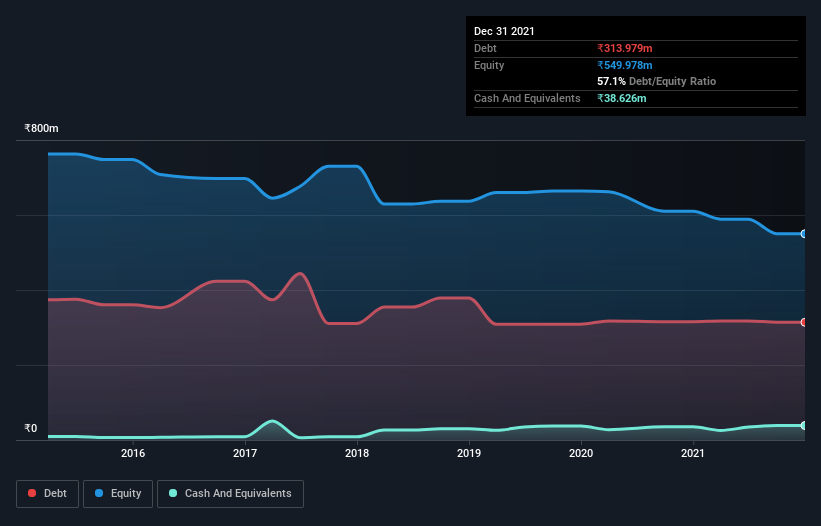Does Ravi Kumar Distilleries (NSE:RKDL) Have A Healthy Balance Sheet?

Legendary fund manager Li Lu (who Charlie Munger backed) once said, 'The biggest investment risk is not the volatility of prices, but whether you will suffer a permanent loss of capital.' So it might be obvious that you need to consider debt, when you think about how risky any given stock is, because too much debt can sink a company. We can see that Ravi Kumar Distilleries Limited (NSE:RKDL) does use debt in its business. But the more important question is: how much risk is that debt creating?
When Is Debt A Problem?
Debt and other liabilities become risky for a business when it cannot easily fulfill those obligations, either with free cash flow or by raising capital at an attractive price. In the worst case scenario, a company can go bankrupt if it cannot pay its creditors. However, a more common (but still painful) scenario is that it has to raise new equity capital at a low price, thus permanently diluting shareholders. By replacing dilution, though, debt can be an extremely good tool for businesses that need capital to invest in growth at high rates of return. The first thing to do when considering how much debt a business uses is to look at its cash and debt together.
Check out our latest analysis for Ravi Kumar Distilleries
What Is Ravi Kumar Distilleries's Net Debt?
The chart below, which you can click on for greater detail, shows that Ravi Kumar Distilleries had ₹314.0m in debt in September 2021; about the same as the year before. However, it also had ₹38.6m in cash, and so its net debt is ₹275.4m.

A Look At Ravi Kumar Distilleries' Liabilities
According to the last reported balance sheet, Ravi Kumar Distilleries had liabilities of ₹640.1m due within 12 months, and liabilities of ₹120.3m due beyond 12 months. Offsetting these obligations, it had cash of ₹38.6m as well as receivables valued at ₹614.6m due within 12 months. So its liabilities total ₹107.2m more than the combination of its cash and short-term receivables.
This deficit isn't so bad because Ravi Kumar Distilleries is worth ₹235.7m, and thus could probably raise enough capital to shore up its balance sheet, if the need arose. However, it is still worthwhile taking a close look at its ability to pay off debt. When analysing debt levels, the balance sheet is the obvious place to start. But it is Ravi Kumar Distilleries's earnings that will influence how the balance sheet holds up in the future. So if you're keen to discover more about its earnings, it might be worth checking out this graph of its long term earnings trend.
In the last year Ravi Kumar Distilleries had a loss before interest and tax, and actually shrunk its revenue by 78%, to ₹40m. That makes us nervous, to say the least.
Caveat Emptor
Not only did Ravi Kumar Distilleries's revenue slip over the last twelve months, but it also produced negative earnings before interest and tax (EBIT). Indeed, it lost a very considerable ₹62m at the EBIT level. Considering that alongside the liabilities mentioned above does not give us much confidence that company should be using so much debt. Quite frankly we think the balance sheet is far from match-fit, although it could be improved with time. We would feel better if it turned its trailing twelve month loss of ₹146m into a profit. So to be blunt we do think it is risky. There's no doubt that we learn most about debt from the balance sheet. However, not all investment risk resides within the balance sheet - far from it. To that end, you should be aware of the 3 warning signs we've spotted with Ravi Kumar Distilleries .
Of course, if you're the type of investor who prefers buying stocks without the burden of debt, then don't hesitate to discover our exclusive list of net cash growth stocks, today.
New: AI Stock Screener & Alerts
Our new AI Stock Screener scans the market every day to uncover opportunities.
• Dividend Powerhouses (3%+ Yield)
• Undervalued Small Caps with Insider Buying
• High growth Tech and AI Companies
Or build your own from over 50 metrics.
Have feedback on this article? Concerned about the content? Get in touch with us directly. Alternatively, email editorial-team (at) simplywallst.com.
This article by Simply Wall St is general in nature. We provide commentary based on historical data and analyst forecasts only using an unbiased methodology and our articles are not intended to be financial advice. It does not constitute a recommendation to buy or sell any stock, and does not take account of your objectives, or your financial situation. We aim to bring you long-term focused analysis driven by fundamental data. Note that our analysis may not factor in the latest price-sensitive company announcements or qualitative material. Simply Wall St has no position in any stocks mentioned.
About NSEI:RKDL
Ravi Kumar Distilleries
Engages in the manufacture, sale, and trading of Indian made foreign liquors in India.
Good value with acceptable track record.
Market Insights
Community Narratives




